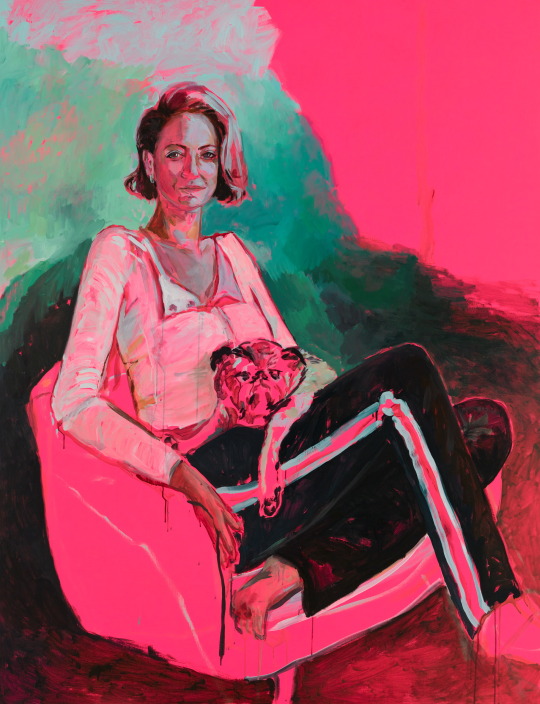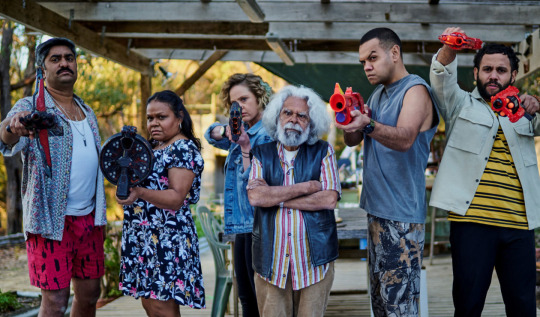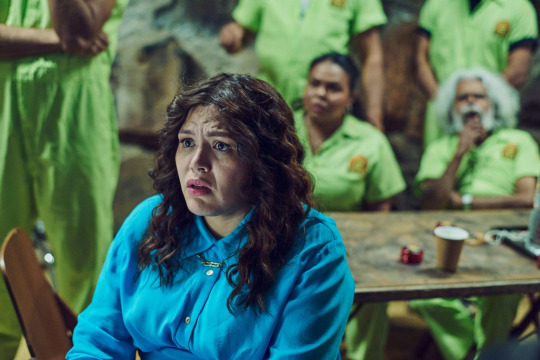#Indigenous presenter of Australian breakfast television.
Photo

Brooke and Jimmy - Laura Jones , 2022.
Australian, b. 1982-
oil and acrylic on linen , 183 x 198 cm.
#Laura Jones#australian artist#female portrait#Brooke Boney#Indigenous presenter of Australian breakfast television.#Gamilaroi woman#pet#dog
89 notes
·
View notes
Text
Nakkiah Lui finds the ‘pathos and heart’ in doomsday survivalism
In her new ABC TV comedy Preppers, playwright, screenwriter and actor Nakkiah Lui explores the good times, the bad times, and the end times.
Written by Walter Marsh

Preppers centres on a group of mainly Aboriginal and Torres Strait Islander survivalists led by Uncle Monty (Jack Charles). Photo: ABC TV
“I think it’s a really interesting community to draw from for comedy,” Lui says of the international doomsday prepping movement, which she first discovered through docu-tainment shows like National Geographic’s Doomsday Preppers, before going down the internet rabbit hole herself.
“There are so many extremes, but it also really deeply connects to your humanity; what is that we’re trying to do? What is it that we’re surviving for? What is it that we think the world will look like after the end of the world? I think that was just ripe for writing about.”
Having initially made her name as a playwright (her 2017 Christmas comedy Black is the New White reached South Australian audiences as part of State Theatre Company’s 2019 season), Lui has been increasingly focussed on the screen of late, with an HBO show in development alongside recent stints in the writers’ room for ABC drama Total Control and Stan/Hulu’s period comedy The Great.
In Preppers, Lui and co-creator Gabe Dowrick, who is also her husband, swap out the armageddon-obsessed Americans typically seen building bunkers and stockpiling supplies for a group of Aboriginal and Torres Strait Islander survivalists – along with a handful of non-Indigenous blow-ins. The ragtag bunch are readying their secluded community of Eden 2 for a shopping list of disaster scenarios including “global wars, civil wars, nuclear wars, race wars, alien invasions, overpopulation, bushfires, tidal waves, climate change, [and] super volcanoes”, when Lui’s character Charlie arrives.
"Aboriginal people are kind of like the original survivalists"
A breakfast television presenter in the midst of what Lui describes as “her own personal apocalypse”, Charlie has returned to her family’s country property only to discover that Nanna has handed it over to the preppers’ leader, Uncle Monty (Jack Charles), under a“10,000-year legally-binding lease for the continued survival of Aboriginal people”.
“Charlie’s a character who’s the epitome of the ‘good Aboriginal’ – which in a way comes from quite a racist place,” Lui says of her character’s lifelong attempt to assimilate, which ends in a career implosion that recalls Lui’s guest appearance in the acclaimed finale of ABC satire Get Krack!n.
“Charlie’s tried to create this life where she’s done everything that she thinks is right – or ‘White’ – just in order to survive, but has created this gilded cage and has no idea who she is or any hope for the future. So in a way, for her to be able to find a future, she has to burn everything around her to the ground.”

Nakkiah Lui as Charlie – a character she says is a character who’s the epitome of the ‘good Aboriginal’. Photo: ABC TV
That episode of Get Krack!n, a funny yet searing indictment of Australian TV that saw Lui play a fictionalised parody of herself, has since become the subject of enough confected culture war stoushes to make anyone want to bunker down.
“I realised after [Preppers] was written, and we’d wrapped production, that in a way maybe I was wondering if I could survive that myself – and I was maybe exploring that through Charlie’s character. How do you survive that kind of outrage, cancellation, and how do you find some kind of empowerment in your life and career?”
The kind of survival that Charlie finds in Eden 2 is what Lui says gave Preppers its “pathos and heart”.
“When I got really into those shows, I started thinking, what do I think the world will look like? Then I had this thought: well, 1788 was an apocalypse of sorts for Aboriginal people. Homes and families destroyed in all these disastrous ways; people speculate about how the world will end – that happened. So I was like, well hey, Aboriginal people are kind of like the original survivalists, it would be kind of silly not to doomsday prep again.”
That idea allowed Lui to explore a different kind of prepper community to the ones she had previously seen on screen.
“I think the representations of a lot of those shows that I was really into tended to be a lot of White men, and what ‘survival’ looks like to them. In the shows I watched, and this is a generalisation, but it was often quite combative, and harsh and violent. But I remember this one couple who were more progressive and hippy, and they were like, ‘We’re going to give all our vegetables to everybody!’
“We might have this idea about who doomsday preppers and survivalists are, but I know that for myself, my family – my parents, my grandparents – they survived so much, and yet they were able to create hope. With Preppers, that’s what we ultimately wanted to do, to create a show that is about hope and community at the end of the day.”
Not just stockpiling ammo – or toilet paper?
“I could not have predicted that it would have been toilet paper,” she laughs of the last-minute panic prepping that has unfolded across Australia in the last year, “and neither could any of these doomsday peppers in the shows that I researched. It never came up!”
Preppers airs on ABC TV from Wednesday, November 10.
Source: InDaily Australia
6 notes
·
View notes
Text
Report roundly criticizes ‘whitewashed’ face of Australian TV news and current affairs
A new report by Media Diversity Australia highlights the dominance of presenters, commentators and reporters of Anglo-Celtic background in national television news and current affairs. Anglo-Celtic people are those of British and Irish descent.
Their research looked at 81 news and current affairs programs broadcast across free-to-air television over a two week period in June 2019, involving 270 presenters, commentators and reporters.
Anglo-Celtic dominance
75 percent of presenters, commentators and reporters have an Anglo-Celtic background compared with 58 percent of all Australians. 6 percent of presenters, commentators and reporters have either an Indigenous or non-European background compared with 24 percent in the general population.
Breakfast television shows had very few people of a non-European or Indigenous background. One of the most prominent presenters, Nine Network’s Today Show host Karl Stefanovic, clearly felt misrepresented, tweeting:
0 notes
Text
Report roundly criticizes ‘whitewashed’ face of Australian TV news and current affairs
New Post has been published on http://khalilhumam.com/report-roundly-criticizes-whitewashed-face-of-australian-tv-news-and-current-affairs/
Report roundly criticizes ‘whitewashed’ face of Australian TV news and current affairs
75 percent of presenters, commentators and reporters have an Anglo-Celtic background
Seven Sunrise Breakfast show promotion 2016 -video screenshot from YouTube
A new report by Media Diversity Australia highlights the dominance of presenters, commentators and reporters of Anglo-Celtic background in national television news and current affairs. Anglo-Celtic people are those of British and Irish descent. Their research looked at 81 news and current affairs programs broadcast across free-to-air television over a two week period in June 2019, involving 270 presenters, commentators and reporters.
Anglo-Celtic dominance
75 percent of presenters, commentators and reporters have an Anglo-Celtic background compared with 58 percent of all Australians. 6 percent of presenters, commentators and reporters have either an Indigenous or non-European background compared with 24 percent in the general population. Breakfast television shows had very few people of a non-European or Indigenous background. One of the most prominent presenters, Nine Network’s Today Show host Karl Stefanovic, clearly felt misrepresented, tweeting:
Im not sure how diverse you need to be to qualify for diverse but I’m of Yugoslav German and British heritage with a surname Stefanovic. I used to be called a wog at school. I’m proud of my heritage. Im pretty sure it’s diverse and nine have always supported that. — Karl Stefanovic (@karlstefanovic) August 16, 2020
The Twitter storm that followed Karl’s tweet was covered in detail by the Special Broadcasting Service (SBS), which is government owned and has an obligation to provide multi-lingual and multi-cultural media services. SBS World News was part of the survey but not their National Indigenous Television (NITV) programs. This was one of the milder responses to Stefanovic on Twitter:
I'm of Serbian background (both parents are Serbian), and am proud of my heritage. But we are white. No one can look at us and tell we're “ethnic”, and we haven't faced the challenges of being judged based on our skin tone. That's what the study is alluding to. It isn't about us — Dany Savovic (@d818581dany) August 17, 2020
The Seven Network Sunrise breakfast program, a rival of the Today Show, also copped criticism on social media after the news.com.au article that Karl had responded to. Academic Susan Carland seemed to enjoy posting this image from the story:
This caption pic.twitter.com/WLmVmdmdFh — Susan Carland (@SusanCarland) August 17, 2020
Diverse background a career barrier
As part of the research, more than 300 television journalists completed a survey in June 2020 examining their perception of cultural diversity. More than 70 percent of participants rated the representation of culturally diverse men and women in the media industry either poorly or very poorly. In addition, 77 percent of respondents with diverse backgrounds believed having a diverse cultural background was a barrier to career progression. “Cultural diversity was understood as based on a person’s ethnicity and ancestral background.” Moreover, the report claims that in July 2020, “100% of free-to-air television national news directors in Australia have an Anglo-Celtic background (and they are also all male).” A 2018 report made similar findings about a predominance of Anglo-Celtic company directors in Australian boardrooms calling the situation, ‘Male, pale, and stale’. Two of the news organisations, namely the Seven and Nine TV networks, have been criticized for their responses to the report. Seven sees it as a “work in progress, while Nine's Darren Wick responded:
However, I don’t think simply counting surnames on TV is an effective way of addressing the issue or helps in finding practical solutions to these challenges.
According to Junkee:
Clearly it’s change that’s sorely needed — but instead of committing to help improve things, they’ve both gone on the defence. They’re now being slammed for their victim-blamey response to the findings.
This comment was typical of the criticism:
This is so disingenuous. I’m Lebanese Australian. I’ve applied for a few jobs at 7 and 9 and haven’t even made it to interview stage. I have a masters degree in journalism and have completed a few unpaid internships in newsrooms. https://t.co/r4enzbAM23 — Shane Bazzi (@shanebazzi) August 17, 2020
STEM journalist Rae Johnston is an Indigenous woman:
I used to produce and host tech segments on mainstream morning television. When they realised I was Aboriginal, they asked me to speak on Indigenous affairs issues. Not long after I refused, I was told they could no longer pay my $250 segment fee. A white man replaced me. https://t.co/DawdPYL6i5 — Rae Johnston (@raejohnston) August 17, 2020
The way forward
The report has five recommendations to improve the situation: 1: Make the case for diversity
2: Collect data on cultural diversity
3: Establish targets to increase cultural diversity
4: Recognise the economic benefits of a more culturally diverse workforce
5: Prioritise diversity in the organization’s approach to recruitment and promotion SBS and the other national broadcaster, the Australian Broadcasting Corporation (ABC), are required to measure and report cultural diversity but commercial networks are not. CALD (culturally and linguistically diverse) journalist, Andrea Ho, was a member of the ABC’s diversity and inclusion committee when she was recently made redundant. She sent a warning to old media about the urgent need for change:
Important research from @MediaDiverseAU today. But don’t act surprised, we CALD journos told our employers for years. And slogged to change the status quo. CALD audiences have great choices now, so here’s your leaver for change – or it’ll be a death knell #diversityinmedia https://t.co/O7ASR48vOx — Andrea Ho (@Andrea_K_Ho) August 17, 2020
One of the report's authors, Usha M. Rodrigues, explored the findings on The Conversation with Whitewash on the box: how a lack of diversity on Australian television damages us all:
The study also examined more than 19,000 news and current affairs items from Australian free-to-air metropolitan and regional networks, broadcast over two weeks in June 2019. It found the lack of diversity is also reflected in the stories programs make, the issues they examine and the way they examine them.
You can download the full report here.
Written by Kevin Rennie
0 notes